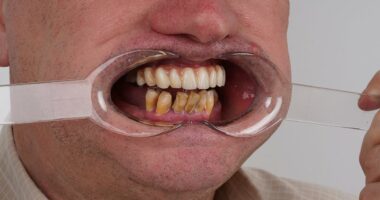Share this @internewscast.com
As we get further into summer, a vet has issued crucial advice on what steps not to take if you suspect your dog is suffering from heatstroke, a condition that becomes a serious risk in warmer weather.
With daily walks being a routine for many dog parents, the RSPCA warns that heatstroke can occur when dogs overheat and can’t cool down by panting, a situation which could potentially be life-threatening.
In case of heatstroke, signs to watch for include heavy panting, difficulty breathing, excessive drooling, lethargy, drowsiness, unco-ordination, collapse, or vomiting.
On social media, Cat, a UK-based vet, who frequently shares her expertise online, has posted an enlightening TikTok video pinpointing what to avoid doing if you think your dog has heat stroke.
And she warned not to believe a common myth.
1. Don’t squirt lemon juice in a dog’s mouth
She cautioned pet owners against squirting lemon juice into their dog’s mouth, commenting on the bizarre nature of this misconception saying: “It’s amazing that you even have to say that and goodness knows where this ridiculous myth came from and unfortunately, it seems to be really common in forums for like the flat face breed particularly, who are most vulnerable to heat stroke and who least are going to benefit from having lemon juice squirted into their mouth at the point where they’re already struggling to breathe.”
Cat has debunked the harmful myth that lemon juice can help dogs with heatstroke, urging owners to “completely ignore” such dangerous advice. Bluebell Pet Care has warned against the summer circulation of misguided tips like ‘give a dog lemon juice if they’re overheating, it clears the airway and breaks down mucus’.
On its website, Bluebell Pet Care states: “There’s no scientific evidence to support the idea that lemon juice helps dogs recover from heat stroke.” The site details the potential harm citrus juice can cause, highlighting: “In fact, citrus juice can irritate a dog’s stomach and mouth, especially when they’re already in distress.”
It also clarifies that lemon juice is not effective at reducing a dog’s body temperature, hydrating them, or reversing overheating effects. The pet care resource further warns about the risks of giving lemon juice to a dog when it is weak, disoriented or even unconscious due to dangers of choking or aspiration, which only adds to the crisis.
2. Don’t be scared to get a dog wet with cold water
Emphasising effective cooling methods, Cat advised: “Number two – do not be afraid to get them wet, really wet, soaked to the skin wet with water that can be as cold as you like.” She shared how immediate wetting of dogs showing signs of heatstroke before reaching the vet improves their survival chances, as many often completely en route.
The RSPCA’s online guidance for emergency first aid for dogs advises submerging or covering the dog in water that is cooler than its body temperature, but cautions against pouring water over the dog’s head or face, ensuring these areas remain above water. Another piece of advice from the animal welfare charity is to “continue pouring cool water over the dog until their breathing starts to settle, but not so much that they start shivering.”
3. Don’t rush home if your dog struggles on a walk
Cat’s final piece of advice is if you notice your dog panting excessively during a walk, don’t immediately head home. Instead, find a shady spot and let your pet cool down.
For small dog owners who drive, the vet suggests carrying your pet back to the car. Once at the car, “open the doors and windows, get the air con on and cool that car down before you get in it to drive home.”
She emphasised that this is especially crucial if you plan to put your dog in the boot, which can “get incredibly hot under the glass.”














